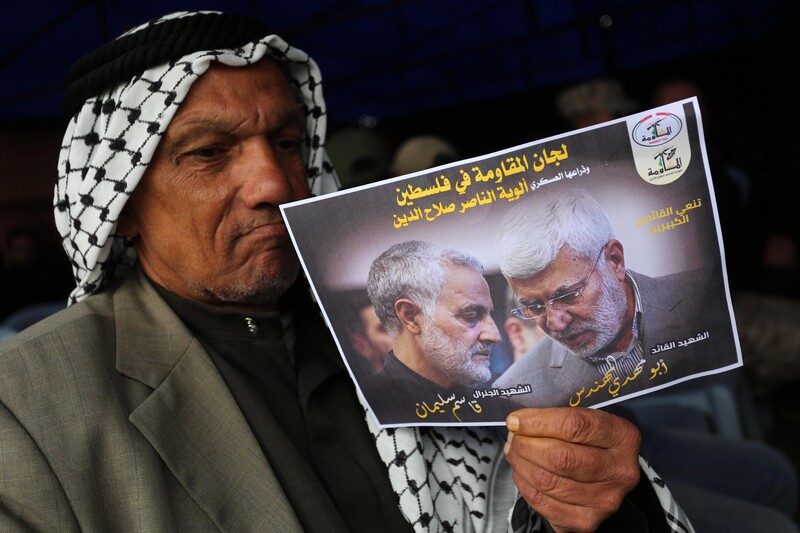Power Suits 10 January 2020

Palestinians attend a mourning ceremony for assassinated Iranian general Qasem Soleimani in Gaza City on January 4.
APA imagesAfter a collective stare into the abyss, the Middle East, it would seem, is breathing a little easier today.
This, of course, is highly relative relief. Both Tehran and Washington may have taken a step back from a full-blown confrontation, but the entire region, lawless and chaotic as it already was, is that much more lawless and chaotic after the US assassination in Baghdad last week of Iranian general Qasem Soleimani.
The assassination is unlikely to be forgotten even after Iran showed how precise its missiles have become by avoiding any casualties in strikes against US bases in Iraq on Wednesday.
“Collateral damage” in this show-down may – or may not – have included a Ukrainian passenger jet with 176 people onboard.
A return to “normalcy” saw Israel reportedly bomb Syria yet again – for the well over 100th time since 2011 – as the region’s many proxy wars continue to play out.
Syria, Iraq, Libya and Yemen (nearly forgotten) provide the main arenas for these mini-conflicts that, for the past week, threatened briefly to seem like the good old days.
Restraint is its own power
And what has been learned?
Iran is both more and less powerful than presumed.
Iran’s revenge did not match its fiery rhetoric. By all reports, Tehran’s actual response to Soleimani’s assassination – for which his successor threatened to “set ablaze the places Americans love” – amounted to a lobby of ballistic missiles fired at two US bases, with a heads-up warning to Iraq’s government.
No one was reported hurt or killed.
But restraint is its own power. No one, least of all in Tehran, thinks for a moment that Iran’s conventional military abilities is any match for the US.
This, after all, is a country that has suffered and continues to suffer punishing sanctions for decades.
Its military hardware is largely obsolete. Its military threat is vastly overstated, too, by elements in Israel and the Gulf for whom presenting a looming threat from Iran’s Shiite leadership serves their own interests.
On the other hand, punishing sanctions or not, Iran also proved that its missiles are capable of reaching where they intend them to reach.
And of course, it has allies and friends, in Lebanon, in Syria, in Gaza and in Iraq, thanks to a US invasion there in 2003 that was conducted under false pretenses.
Tehran’s restraint is ultimately submission to reality. The Iranian leadership will work within its capabilities.
This is not over. Iran was never about a direct showdown with the US. Its strategy is much longer term.
Power is everything
Which makes Iran’s leadership the complete opposite of the US president.
In some ways, Donald Trump’s view of international relations is refreshingly simple.
If you have power, you have a voice. All the rest is for the prattling classes. Hence his utter disregard for multinational institutions like the United Nations and international law.
Hence his demands to Europe and NATO to “step up.”
Hence, too, his apparent respect for leaders like Vladimir Putin and Recep Tayyip Erdogan, neither of whom are afraid to flex their military muscles abroad, whether in their own “backyards” (Ukraine and Syria respectively), or much further afield (Syria and Libya, respectively).
The problem with wielding nearly unchallenged power is complacency. And Trump has shown again and again that, while he is willing to use power – to tear up trade agreements, lock up immigrants, bomb foreign countries, assassinate foreigners – he is far less interested in putting in the hours to think up any accompanying strategy.
Why bother with strategy when you have that much power? Trump can set a fire and put it out, claiming credit for it all.
Indeed, if there is any silver lining to this past week, it may be that Washington might now be more amenable to diplomacy with Tehran, to finally put out the fire the Trump administration lit when it pulled out of the nuclear agreement in 2018.
It is effective theater. Like fireworks, it has us all gawking. But it’s ultimately hollow.
The given situation – with Mexico, with Syria, with North Korea, with Iran – remains. The fundamentals are unchanged.
Lessons for Palestine
Trump’s weak-kneed fawning over powerful men also goes some way to explain his position on Palestine.
The Palestinians have no power and therefore no voice. The main question for Trump on Palestine appears to be how he can help his friend, Israeli Prime Minister Benjamin Netanyahu (whom he seems to admire for being happy to bomb defenseless civilians in Gaza to smithereens when he needs the votes) to get re-elected.
With two Israeli elections last year, Trump has had plenty of chances to prove his generosity and he has never failed.
First, he granted US blessing to Israel’s annexation of Jerusalem. Next, he recognized Israel’s annexation of the Golan Heights.
Then he flashed Israel a green light to carry on with settlement building in occupied Palestinian territory.
Now, Trump is reportedly mulling whether to release his administration’s much anticipated (and ridiculed) peace deal-to-end-all-peace-deals ahead of Israel’s third election due in March.
The question for both Trump and Netanyahu – who shares with his American benefactor a disdain for foresight – is not what will happen with millions of legally disenfranchised people under Israeli rule, but how to ensure not just Netanyahu’s reelection but his immunity from prosecution on corruption charges.
Future be damned.
The temptation for Palestinians, as it appears to be for Iran and much of the rest of the world, is to simply sit tight, ride out the storm and wait for Trump to ride off into the sunset, whether later this year or in another five.
Unlike Iran (and the rest of the world), Palestinians are watching the ground literally disappear beneath them.
Wisdom does not always lie in restraint. Palestinians may need to find radical answers.





Comments
Time to try a new strategy - Satyaghara?
Permalink New strategy? Satyaghara? replied on
Maybe its time to try a new strategy, Satyaghara which was developed by & worked for Mahatma Gandhi is one thought here which I'd love to see the Palestinians try?
Maybe its also time to consider giving Israel an ultimatum : either give us our own state without delay now or give us full & equal civil & political rights as Israeli citizens inside your country making Israel no longer a Jewish state but instead a bi-national, multicultral one? Insist they pick one.
Insist they pick one.
Permalink John m Costello replied on
Isn't the real question; who's going to make them? The only chance I glimpse is that the US Congress tacks progressive enough that Israel get's called on their boast that they don't need US anymore because they've moved into a more self-sustaining position, which can earn them alliances with other major nations, for trade and market stability. Personally I think that's just brag, not fact but I also am not confident that the US can become that progressive short of a civil war.
So again; who's going to make them? Brussels, the Hague? I think that would likewise necessitate a war, or lead to one.
So the biggest question is still; What will make America more progressive? Bernie? Anyone but Trump? Socio-economic contradictions and time? Do we have that? The rise of China or maybe Trump running US into the ground is it?